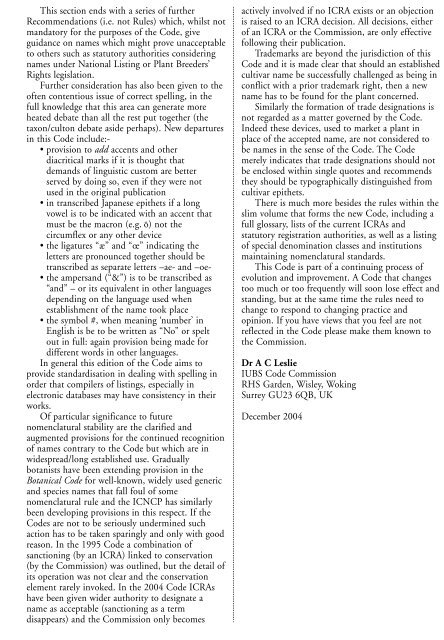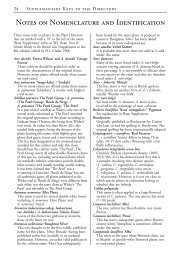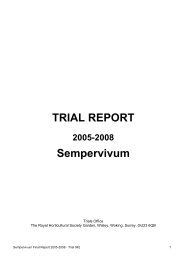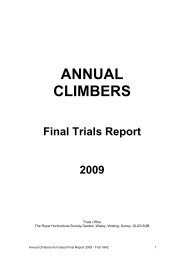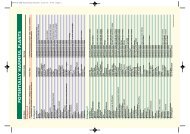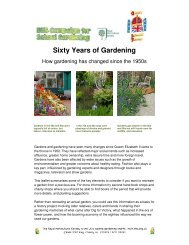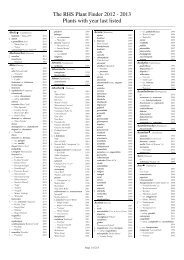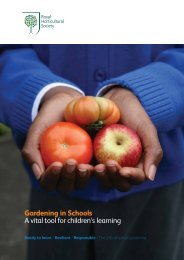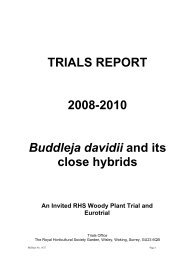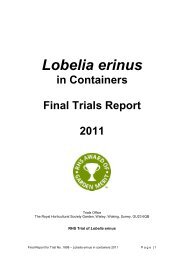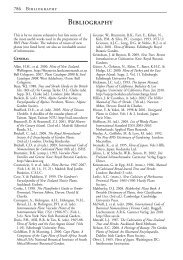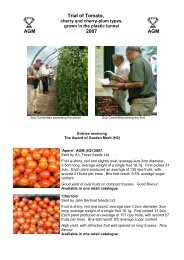The Cultivated Plant Code (108KB) - Royal Horticultural Society
The Cultivated Plant Code (108KB) - Royal Horticultural Society
The Cultivated Plant Code (108KB) - Royal Horticultural Society
You also want an ePaper? Increase the reach of your titles
YUMPU automatically turns print PDFs into web optimized ePapers that Google loves.
This section ends with a series of further<br />
Recommendations (i.e. not Rules) which, whilst not<br />
mandatory for the purposes of the <strong>Code</strong>, give<br />
guidance on names which might prove unacceptable<br />
to others such as statutory authorities considering<br />
names under National Listing or <strong>Plant</strong> Breeders’<br />
Rights legislation.<br />
Further consideration has also been given to the<br />
often contentious issue of correct spelling, in the<br />
full knowledge that this area can generate more<br />
heated debate than all the rest put together (the<br />
taxon/culton debate aside perhaps). New departures<br />
in this <strong>Code</strong> include:-<br />
• provision to add accents and other<br />
diacritical marks if it is thought that<br />
demands of linguistic custom are better<br />
served by doing so, even if they were not<br />
used in the original publication<br />
• in transcribed Japanese epithets if a long<br />
vowel is to be indicated with an accent that<br />
must be the macron (e.g. - o) not the<br />
circumflex or any other device<br />
• the ligatures “æ” and “œ” indicating the<br />
letters are pronounced together should be<br />
transcribed as separate letters –ae- and –oe-<br />
• the ampersand (“&”) is to be transcribed as<br />
“and” – or its equivalent in other languages<br />
depending on the language used when<br />
establishment of the name took place<br />
• the symbol #, when meaning ‘number’ in<br />
English is be to be written as “No” or spelt<br />
out in full: again provision being made for<br />
different words in other languages.<br />
In general this edition of the <strong>Code</strong> aims to<br />
provide standardisation in dealing with spelling in<br />
order that compilers of listings, especially in<br />
electronic databases may have consistency in their<br />
works.<br />
Of particular significance to future<br />
nomenclatural stability are the clarified and<br />
augmented provisions for the continued recognition<br />
of names contrary to the <strong>Code</strong> but which are in<br />
widespread/long established use. Gradually<br />
botanists have been extending provision in the<br />
Botanical <strong>Code</strong> for well-known, widely used generic<br />
and species names that fall foul of some<br />
nomenclatural rule and the ICNCP has similarly<br />
been developing provisions in this respect. If the<br />
<strong>Code</strong>s are not to be seriously undermined such<br />
action has to be taken sparingly and only with good<br />
reason. In the 1995 <strong>Code</strong> a combination of<br />
sanctioning (by an ICRA) linked to conservation<br />
(by the Commission) was outlined, but the detail of<br />
its operation was not clear and the conservation<br />
element rarely invoked. In the 2004 <strong>Code</strong> ICRAs<br />
have been given wider authority to designate a<br />
name as acceptable (sanctioning as a term<br />
disappears) and the Commission only becomes<br />
actively involved if no ICRA exists or an objection<br />
is raised to an ICRA decision. All decisions, either<br />
of an ICRA or the Commission, are only effective<br />
following their publication.<br />
Trademarks are beyond the jurisdiction of this<br />
<strong>Code</strong> and it is made clear that should an established<br />
cultivar name be successfully challenged as being in<br />
conflict with a prior trademark right, then a new<br />
name has to be found for the plant concerned.<br />
Similarly the formation of trade designations is<br />
not regarded as a matter governed by the <strong>Code</strong>.<br />
Indeed these devices, used to market a plant in<br />
place of the accepted name, are not considered to<br />
be names in the sense of the <strong>Code</strong>. <strong>The</strong> <strong>Code</strong><br />
merely indicates that trade designations should not<br />
be enclosed within single quotes and recommends<br />
they should be typographically distinguished from<br />
cultivar epithets.<br />
<strong>The</strong>re is much more besides the rules within the<br />
slim volume that forms the new <strong>Code</strong>, including a<br />
full glossary, lists of the current ICRAs and<br />
statutory registration authorities, as well as a listing<br />
of special denomination classes and institutions<br />
maintaining nomenclatural standards.<br />
This <strong>Code</strong> is part of a continuing process of<br />
evolution and improvement. A <strong>Code</strong> that changes<br />
too much or too frequently will soon lose effect and<br />
standing, but at the same time the rules need to<br />
change to respond to changing practice and<br />
opinion. If you have views that you feel are not<br />
reflected in the <strong>Code</strong> please make them known to<br />
the Commission.<br />
Dr A C Leslie<br />
IUBS <strong>Code</strong> Commission<br />
RHS Garden, Wisley, Woking<br />
Surrey GU23 6QB, UK<br />
December 2004


